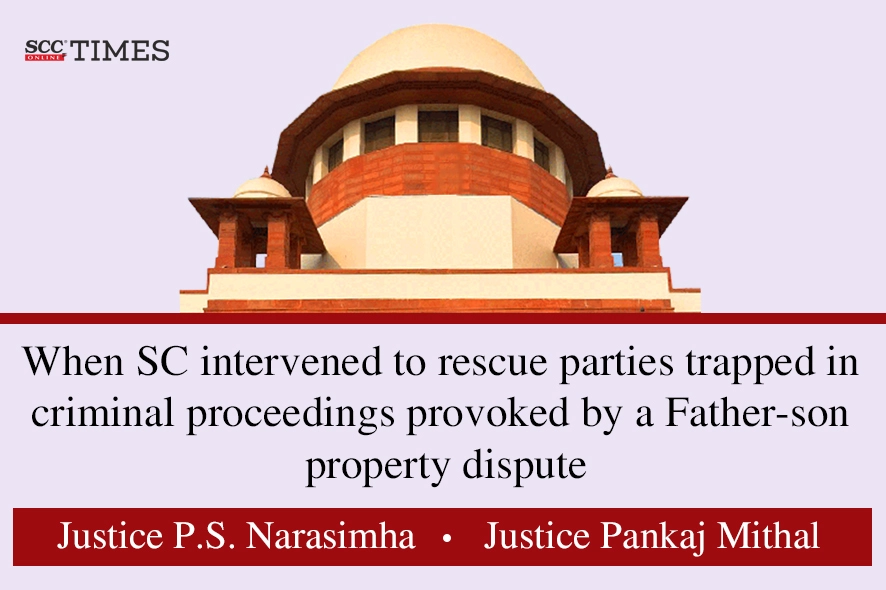Supreme Court: The instant appeal challenged the decision of Bombay High Court wherein it had held that a prima facie case of cruelty was made out under Section 498-A, Penal Code, 1860 against the appellants and had refused to quash the FIR and chargesheet against them. The Division Bench of P.S. Narasimha* and Pankaj Mithal, JJ., noted in the instant case the provocation for the Complaint/FIR was essentially the property dispute between father and son and the case is yet another instance of abuse of criminal process and it would not be fair to subject the appellants to the entire criminal law process.
Background:
Respondent 2 (complainant) filed a complaint making multiple allegations against the appellants including demand for dowry, cruelty and threat to herself, husband and her family. An FIR was registered on 25-3-2013 at P.S. Jalna, Maharashtra under Sections 498A, 323, 504, 506 read with Section 34 IPC and subsequently a chargesheet came to be filed on 30-07-2013.
The appellants approached the High Court under Section 482, CrPC, however, the High Court dismissed the application finding that a prima facie case of cruelty was made out against the appellants.
Counsels for the appellants argued that the allegations in the FIR are general and omnibus in nature and lack material particulars bereft of any details, rendering the complaint vague and obscure. It was pointed out that there is an existing civil dispute between the father-in-law (Appellant 3) and his son (Respondent 2’s husband) and as such this FIR is an abuse of the process of criminal law. Further, Section 161, CrPC statements of witnesses are identical and are based on information from Respondent no. 2, which are vague and do not have material particulars about the date and time of the incident.
Per contra, the respondents supported the impugned decision of the High Court.
Court’s Assessment:
Perusing the complaint, the allegations and the impugned order, the Court noted that after identifying certain allegations in the complaint/FIR, the High Court concluded that there are specific allegations against each appellant. After referring to certain precedents on the scope and ambit of the power under Section 482 CrPC, the High Court again concluded that exercise of power under Section 482 for quashing an FIR/Complaint is not warranted in the facts and circumstances of the case. Beyond holding that there were specific allegations, the High Court made no other analysis.
The Court reiterated that when its jurisdiction under Section 482 CrPC or Article 226 of the Constitution is invoked on the ground that the Complaint/FIR is frivolous, it is the duty of a High Court to examine the allegations with care and caution.
Examining the complaint, the Court made a unique observation that Respondent 2 had chosen not to involve her husband in the criminal proceedings, particularly when all the allegations relate to demand of dowry. “It appears that the complainant and her husband have distributed amongst themselves the institution of civil and criminal proceedings against the appellants. While the husband institutes the civil suit, his wife, the complainant has chosen to initiate criminal proceedings”.
The Court further noted that there was no reference to the civil proceedings in the criminal one and vice-versa. It was noted that the civil suit instituted by Respondent 2’s husband concerns seeking a declaration that the property is ancestral in nature and that the father has no right to alienate or dispose of the property. In that suit the husband also sought a declaration that he is entitled to use the trademark of the family business.
It was further noted that while the husband chose to institute the civil suit on 27-02-2013, Respondent 2 filed the criminal complaint on 1-03-2013 alleging demand of dowry and threat by appellants that she and her husband will be denied a share in the property.
The Court pointed out that the rights and claims in the civil suit are the very basis and provocation for filing criminal cases against the appellants. It was observed that the Complaint/FIR was replete with just one theme i.e. that the appellants are threatening the respondents that they will deny them share in the property. The Complaint/FIR was intended only to further their interest in the civil dispute.
Examining the specific allegations levelled by Respondent 2, the Court noted that they were general, vague, and omnibus lacking in basic details. “The essence of the complaint is in the alleged threat to deprive the husband any share in the property with respect to which the husband has already filed the suit for declaration”.
Perusing the details, the Court pointed out that one important event giving a clear impression that the criminal proceedings were instituted with a mala fide intention, only to harass the appellants, was the filing of the Domestic Violence case. These allegations were examined in detail, subjected to strict scrutiny, and were rejected as being false and untenable.
Furthermore, the Court observed the chargesheet simply repeated the complaint’s words and the investigation did not yield anything new.
Hence, with the afore-stated assessment, the Court opined that none of the ingredients of Sections 498A, 323, 504, 506 read with Section 34 IPC were made out against the appellants. Therefore, the Court set aside the impugned order of the High Court and the FIR and the chargesheet as well.
CASE DETAILS
|
Citation: Appellants : Respondents : |
Advocates who appeared in this case For Petitioner(s): For Respondent(s): |
CORAM :











